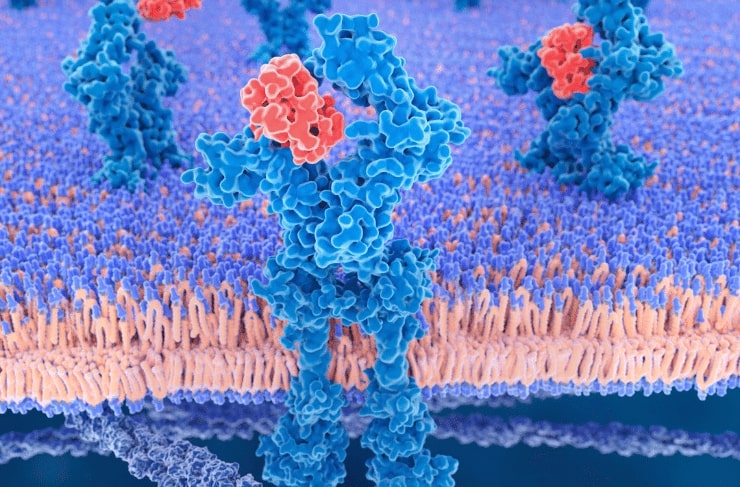Understanding inflammatory mediators is crucial for deciphering autoimmune pathogenesis and diagnostics. Advanced bioanalytical methodologies have enhanced the characterization of immune responses through quantitative analysis and thorough cytokine profiling. Cytokine quantification provides insights into therapeutic targets, treatment monitoring, and disease mechanisms through measurements of pro- and anti-inflammatory molecules in biological samples. This article explores the role of cytokine assays and methodologies in advancing research on autoimmune diseases and drug development.
Fundamentals of cytokine analysis in autoimmune research
Autoimmune diseases have now become a significant public health issue. A major section of diseased individuals comes under autoimmune diseases. A UK-based study of 19 autoimmune diseases reported around 22,009,375 individuals from the year 2000 to 2019. During this period, the newly diagnosed patients were 978,872, with an average age of 54 years. Additionally, some autoimmune diseases show seasonal and regional variations, further impacting the population.
Autoimmune diseases are related to immune imbalances that cause activation of autoreactive immune cells. This aberrant activation results in tissue damage. Tissue tolerance happens both peripherally and centrally. T cells undergo negative and positive selection in the thymus prior to entering the peripheral area to execute immune functions. In the thymus, negative preference to autoreactive T cells is the primary mechanism of central immune tolerance. Tolerance related to peripheral mechanisms can also hinder the autoreactive cell expansion, regulatory T cell induction, or immune anergy. Deletion of peripheral clonal is via restimulation-induced or activation-induced cell death. Immune anergy often delivers its mechanism through numerous immune regulatory-related cells and costimulatory molecules. Besides, helper T cells and follicular DCs can impact immune tolerance conditions.
Must Read: ELISA Assays in Drug Discovery: Role and Importance
T and B cells have established roles in beginning and sustaining autoimmune diseases. In autoimmune diseases, autoreactive T cells enter target tissues. CD8+ cytotoxic T cells contact and kill target cells. CD4+ T cells can give activation signals to B cells or release proinflammatory factors. These secreted proinflammatory factors recruit several myeloid inflammatory cells to tissues and generate immune responses. On the other hand, mature B cells may differentiate into plasma cells and release several autoantigen-targeting antibodies. Autoantibodies kill targeted cells or activate complement systems through antibody-dependent cell cytotoxicity. Additionally, antigen-antibody complex formation is crucial for certain autoimmune diseases, such as SLE, where these complexes are deposited in the kidneys and cause tissue damage through local inflammatory responses. Hence, understanding the role of cytokines becomes significant in autoimmune research.
Cytokine profiling is critical for characterizing autoimmune diseases. It analyzes disease-specific inflammatory elements to make precise diagnoses, prognosis, and therapeutic decisions. Cytokine quantification has comprehensive applications in autoimmune diseases, including multiple sclerosis, rheumatoid arthritis, inflammatory bowel disease, and systemic lupus erythematosus. Hence, the correct identification of cytokine biomarkers becomes useful for activity monitoring, early diagnosis, and predicting therapeutic responses. Approaches such as longitudinal cytokine monitoring are crucial for assessing therapeutic efficacy and disease progression. However, validating biomarker panels, identifying pathogenic thresholds, and establishing reference ranges are necessary for the clinical utility of cytokine data in diverse disease stages and patient populations.
Cytokine assays
Determining the concentrations of specific analytes in biological samples can help understand inflammatory response pathways, immune activity, disease presence and progression, drug-mediated responses, and eventually guide decisions in drug discovery and development. Researchers employ immunoassays to detect and quantify these analyte biomarkers in biomedical and clinical research. Let us explore different formats of Cytokine Assays.
ELISA
ELISA is a commonly used method for detecting and quantifying cytokines. This method is based on the interaction between antigens and antibodies. Despite the widespread applications of ELISA assays, they are time-consuming and need multiple wash steps for analysis.
Flow cytometry
Flow cytometry is a powerful tool for multiparametric analysis of cells. This method simultaneously assesses cell size and granularity. Researchers combine flow cytometry with fluorescently labeled antibodies to detect and measure cytokines at a single-cell level. However, this instrument is expensive and requires expertise to conduct and analyze data.
Western blots
Western blot is another method for determining specific proteins. Although it is not as sensitive as ELISA assays, western blotting can confirm the presence or absence of cytokines and assess their molecular weights in samples such as cells and tissues. However, it requires several days to obtain results, which are mainly qualitative
Multiplex cytokine analysis
Multiplex cytokine assays can include systems such as Luminex xMAP technology or electrochemiluminescence-based detection. Multiplex cytokine analysis has multiple benefits. It assesses the dynamic and complex nature of inflammatory responses in humans. This data can be used to investigate therapeutic effects, understand mechanisms of drug action, and identify molecular mechanisms.
Conclusion
Cytokine assays are robust methodologies in autoimmune disease research and diagnostics. They are essential in advancing autoimmune research and understanding disease pathogenesis. Cytokine quantification helps advance autoimmune therapeutics through biomarker-driven pharmaceutical development and comprehensive profiling of inflammatory cytokines. Besides, specialized Biomarker Services are helping transition early cytokine research into precision medicine approaches and other clinical applications. Hence, understanding the strategic potential of cytokine analysis early during drug development can ensure therapeutic success and support targeted autoimmune interventions.
